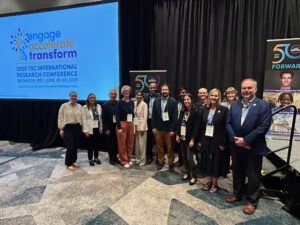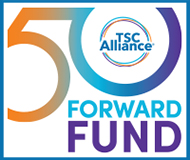
The 2025 TSC International Research Conference: Engage, Accelerate, Transform was held at the Bethesda North Marriott Hotel & Conference Center in North Bethesda, MD June 26-28, 2025. The conference, hosted by the TSC Alliance, welcomed 255 participants from 25 countries. Twelve percent of attendees self-identified as members of groups historically underrepresented in biomedical research. The conference featured 29 main-session oral presentations, nine early-career symposium oral presentations, 56 poster presentations, and three mini-symposia sessions. These mini-symposia, spanning four hours, allowed attendees to participate in interactive group discussions based on interests. The three topics were TSC-Associated Neuropsychiatric Disorders (TAND), mechanisms and genetics of TSC, and LAM and kidney manifestations of TSC. Each mini-symposium sought to bring experts together from different knowledge bases, from basic biology through clinical care, to discuss ongoing challenges and brainstorm future collaborative strategies.
Here are some highlights:
- At the Early Career Researcher Symposium, nine early-stage investigators presented their submitted abstracts. The Symposium concluded with a funding and career panel featuring established TSC researchers and clinicians who provided career advice to those in attendance.
- There is a global effort to improve access to quality care and expand clinical trial recruitment internationally – Concurrent with the conference, TSC International (TSCi) convened a meeting of member organizations where they discussed fostering collaborations between industry, associations, and families to stimulate research worldwide. They also shared an update and next steps for the TANDem project.
- TSC adult manifestations and experiences are a research priority – The first plenary session of the conference focused on translational research in LAM, renal disease, and other topics relevant to adult care, including challenges in pregnancy and TSC, career and relationship issues, and women’s health.
- Epilepsy continues to be a difficult manifestation in TSC – Speakers presented preclinical research to identify new targets for treatment and clinical studies to better understand the effectiveness of current treatments.
- TSC researchers recognize the outsize impact of TSC-Associated Neuropsychiatric Disorders (TAND) on individuals and families – and focused on impacting TAND through basic, translational and clinical research. Presenters representing the spectrum of research from bench to bedside presented on the diverse manifestations of TAND, including sleep issues, emotional dysregulation, and behaviors, and the origins of these manifestations.
- Basic science provides new insights into other cellular and surrounding dysregulation/changes in TSC that provide potential targets for treatment. The final plenary session focused on insights in TSC biology from basic science, cell biology, immunology and neuroscience.
- Researchers are building a roadmap to discoveries and improvements in clinical care. Reports from the session co-chairs of the Mini Symposia highlighted the need for more studies in TAND, LAM and AMLs, and TSC disease mechanisms and genetics, to establish evidence-based standards of care and develop new treatment options.
Help the TSC Alliance accelerate TSC research by donating to the 50 Forward Fund!
